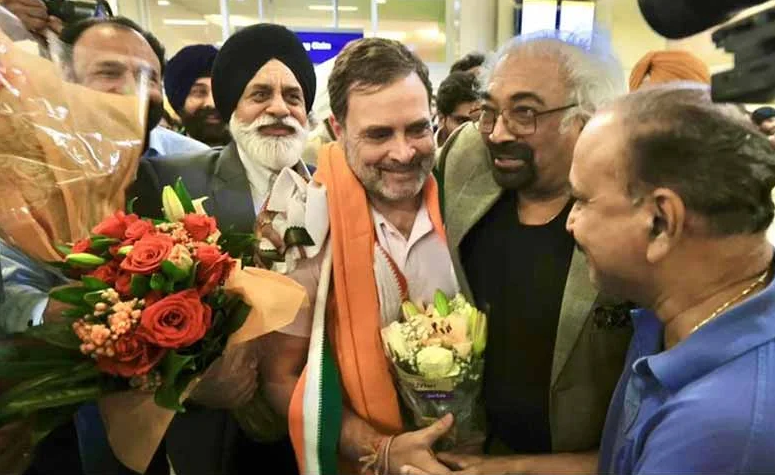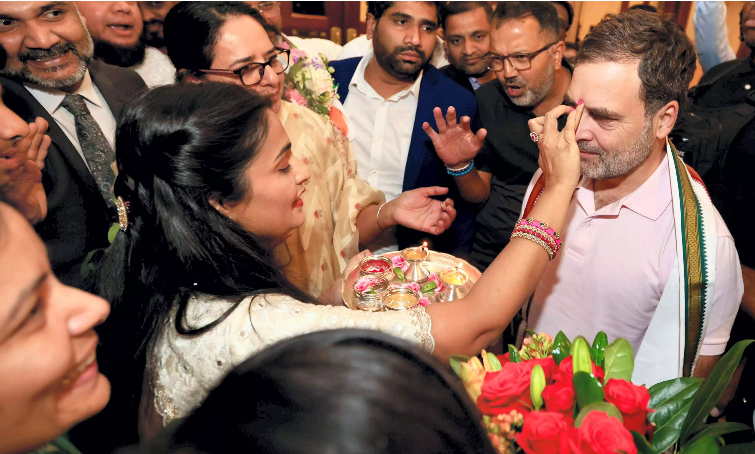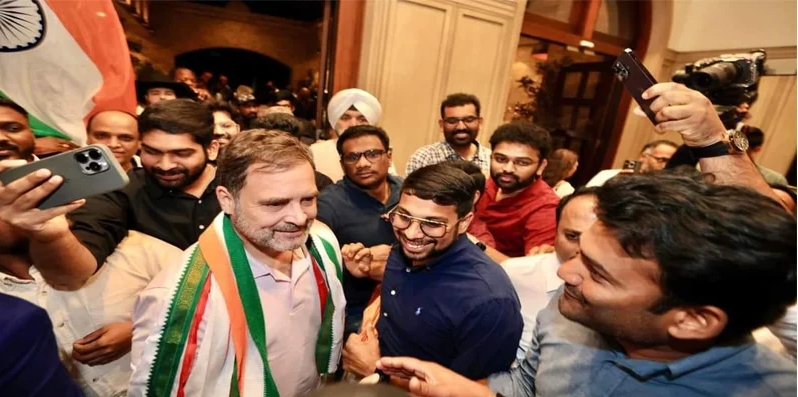Congress leader Rahul Gandhi Congress leader has arrived in the United States, embarking on a visit that carries significant diplomatic, political, and strategic implications. The purpose of the trip, as stated by Gandhi, is to “further strengthen” the bond between India and America, a relationship that has grown increasingly important in the context of global economic shifts, geopolitical realignments, and mutual interests in areas such as technology, climate change, defense, and democratic values.
This visit comes at a time when India and the United States, two of the world’s largest democracies, are grappling with similar challenges, including the rise of authoritarian regimes, economic inequality, and the need for global cooperation in areas like health and climate resilience. Rahul Gandhi’s trip is expected to be more than just a diplomatic engagement—it holds the potential to further Congress’ image abroad and strengthen India’s stance on various global issues while enhancing the dialogue between New Delhi and Washington, D.C.
This article delves into the details of Rahul Gandhi’s visit, the significance of the India-US relationship, and what this trip means for both nations in the current global scenario.
Background: The Evolving India-US Relationship
The relationship between India and the United States has undergone a dramatic transformation over the last few decades. Once fraught with mutual suspicion during the Cold War, the ties between the two countries began to improve significantly in the 1990s, driven by shared interests in economic liberalization, democracy, and global security.
In recent years, the partnership has become a cornerstone of both nations’ foreign policies. India is seen as a strategic partner for the U.S. in the Indo-Pacific region, particularly in countering the influence of China. On the other hand, America remains one of India’s most critical trade and investment partners, contributing to the country’s technological advancement and economic growth.
Rahul Gandhi’s visit is expected to build on this foundation of cooperation. As the scion of one of India’s most influential political families and a prominent leader of the Indian National Congress, his trip underscores the importance of maintaining strong bilateral ties. Gandhi’s presence in the U.S. also allows for a different perspective from India’s opposition party, which is crucial in a democratic setup like India’s.
Objectives of the Visit
Rahul Gandhi’s trip to the U.S. is part of a broader strategy to position India as a global leader while addressing domestic and international concerns. The key objectives of this visit include:  for more information click on this link
for more information click on this link
1. Strengthening Diplomatic Ties
A primary goal of Gandhi’s visit is to fortify the diplomatic relationship between India and the U.S. India’s engagement with the U.S. is crucial for addressing pressing global issues such as regional security, trade dynamics, and the rise of China as a global superpower. By meeting with U.S. officials, think tanks, and other key stakeholders, Rahul Gandhi aims to emphasize the importance of this partnership for global stability.
His presence serves to highlight India’s commitment to fostering a closer relationship with the United States. Additionally, given his stature as a leader of India’s primary opposition party, it provides the U.S. an opportunity to understand perspectives beyond the current ruling government, strengthening ties on a broader, more inclusive front.
2. Engaging with the Indian Diaspora
The Indian diaspora in the U.S. is one of the most significant and influential expatriate communities in the world, contributing to various sectors such as technology, business, education, and politics. Gandhi’s trip offers a chance to engage with this community and leverage its influence in strengthening bilateral relations. The Indian diaspora serves as a crucial bridge between India and the U.S., fostering cultural, economic, and political exchanges that are beneficial to both nations.
By connecting with the diaspora, Gandhi seeks to reaffirm Congress’ commitment to issues that matter to Indians abroad, including immigration policies, opportunities for foreign investment, and the welfare of non-resident Indians (NRIs). The diaspora’s political clout in the U.S. also provides an essential support system for Indian leaders on the global stage.
3. Promoting India’s Vision for a Democratic Global Order
Rahul Gandhi’s visit also comes at a time when both India and the U.S. are navigating challenges to democratic governance. With the rise of populism and authoritarianism globally, there has been increasing pressure on democracies to safeguard their values and institutions. Gandhi, a vocal advocate for democratic rights and freedoms, is expected to use this trip to highlight the importance of maintaining democratic principles amid growing concerns about human rights and the erosion of democratic norms worldwide.
As someone who has been critical of India’s current government, particularly on issues related to democracy and civil liberties, Gandhi is likely to address the global community’s concerns about the state of democracy in India. His engagements will likely include conversations about protecting democratic values and upholding the rule of law, both in India and internationally.
4. Fostering Economic Partnerships and Technology Cooperation
Economic cooperation between India and the U.S. is one of the cornerstones of the bilateral relationship. The U.S. is a critical trading partner for India, and the two nations share significant synergies in industries such as technology, pharmaceuticals, and defense. Gandhi’s visit is expected to include discussions on enhancing economic partnerships, particularly in the technology sector.
India, with its growing startup ecosystem and advancements in technology, has much to offer in terms of collaboration with U.S. tech giants. The visit aims to explore avenues for deeper cooperation in areas like artificial intelligence (AI), cybersecurity, and digital infrastructure, all of which are essential for future economic growth.
5. Addressing Climate Change and Environmental Challenges
Another major focus of Gandhi’s trip is expected to be climate change—a global issue that requires cooperation between nations. India and the U.S. have been working together on initiatives related to renewable energy, reducing carbon emissions, and promoting sustainable development. Rahul Gandhi’s visit offers an opportunity to further these collaborations.
Given the urgent need to address climate change, both nations are likely to discuss strategies for reducing their carbon footprints while promoting economic growth. With India being one of the fastest-growing economies in the world and also one of the largest emitters of greenhouse gases, discussions on balancing development with environmental sustainability will be a key focus during Gandhi’s engagements in the U.S.
Significance of Rahul Gandhi’s Visit for Indian Politics
Rahul Gandhi’s visit to the U.S. holds significant political implications for India. As the leader of the Indian National Congress, the trip offers him a platform to project the party’s vision on a global stage, particularly at a time when the Congress party is positioning itself as an alternative to the ruling Bharatiya Janata Party (BJP).  for more information click on this link
for more information click on this link
1. Reasserting Congress’ Global Relevance
Over the past few years, the Congress party has been facing internal challenges, electoral losses, and questions about its leadership. Rahul Gandhi’s visit to the U.S. presents an opportunity for him to reassert Congress’ relevance on the global front, highlighting its long-standing commitment to democracy, social justice, and inclusive growth. By engaging with U.S. lawmakers, business leaders, and Indian diaspora members, Gandhi can showcase the Congress party as a credible alternative to the current government.
2. Offering a Counter-Narrative to the BJP
Rahul Gandhi has been a vocal critic of Prime Minister Narendra Modi’s government on various issues, including economic policies, the handling of the COVID-19 pandemic, and the state of democracy in India. His visit to the U.S. offers him a platform to present a counter-narrative to the BJP’s policies, particularly on matters related to human rights, governance, and foreign policy.
By meeting with influential figures in the U.S., Gandhi can provide a different perspective on India’s domestic and international policies, highlighting areas where Congress believes the current government has fallen short. This visit could help him bolster his leadership credentials while presenting a vision for India’s future.
3. Building International Support
In an increasingly interconnected world, international support can play a significant role in domestic politics. By strengthening ties with global leaders and the Indian diaspora, Rahul Gandhi can build goodwill and foster relationships that may benefit him and the Congress party in the long term. Engaging with influential diaspora members can also help Congress rally support for future elections, particularly from overseas Indians who maintain strong ties to India.  for more information click on this link
for more information click on this link
Challenges and Expectations
While Rahul Gandhi’s visit to the U.S. holds immense potential, it also comes with its share of challenges. For one, Gandhi will need to address the perception that Congress has struggled to connect with voters at home. Critics have often pointed to the party’s electoral losses as a sign that it lacks a clear vision or strong leadership. The U.S. trip offers an opportunity to counter these narratives, but it will require Gandhi to effectively communicate Congress’ message and objectives.
Furthermore, navigating complex geopolitical dynamics will be a challenge. As India’s opposition leader, Rahul Gandhi must balance critiquing the current government’s policies while ensuring that his statements do not undermine India’s global standing. His meetings with U.S. officials will need to be carefully calibrated to reflect both the aspirations of the Congress party and the broader interests of India.
Conclusion
Rahul Gandhi’s visit to the U.S. is a pivotal moment for both India-U.S. relations and Indian politics. With a focus on strengthening diplomatic ties, engaging with the Indian diaspora, promoting democratic values, and fostering economic and technological cooperation, the visit highlights the importance of the India-U.S. partnership in addressing global challenges. For Gandhi, the trip also offers an opportunity to reassert Congress’ relevance on the global stage and present an alternative vision for India’s future.
As the world watches closely, this visit could play a crucial role in shaping the trajectory of India’s relationship with the U.S. while positioning Rahul Gandhi as a key figure in India’s political landscape. Whether this trip translates into tangible gains for both nations and the Congress party remains to be seen, but its significance cannot be understated. ALSO READ:- iQOO Z9s Pro Review: A Balanced Mid-Range Contender with Power and Features 2024




